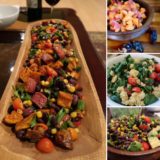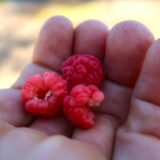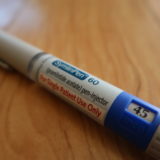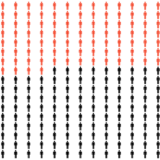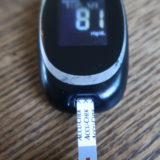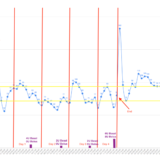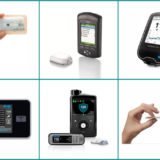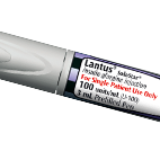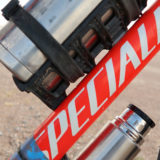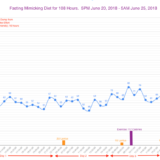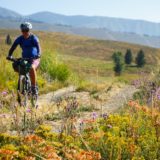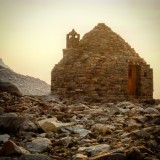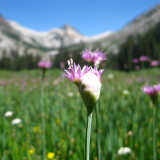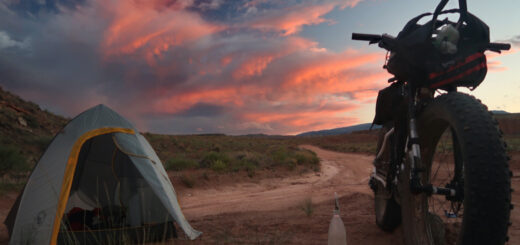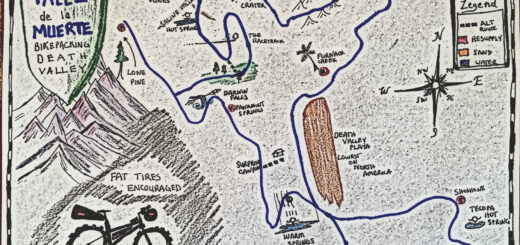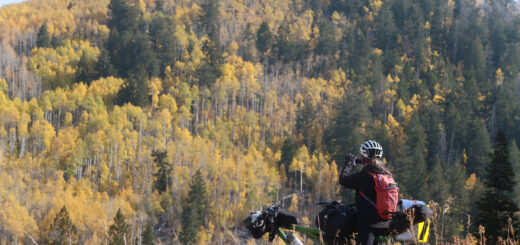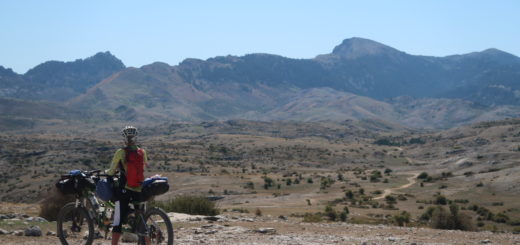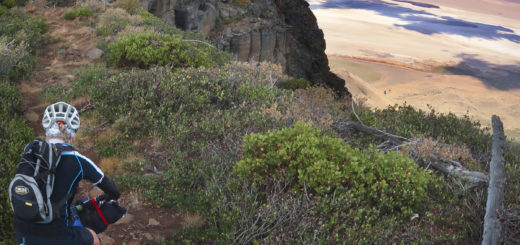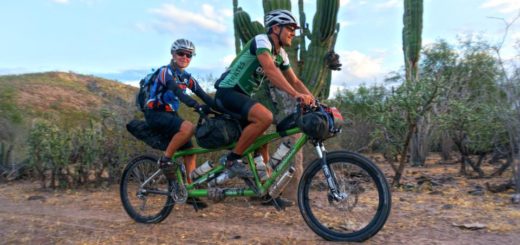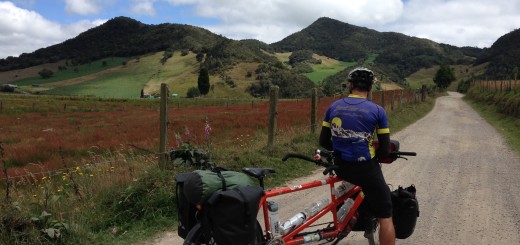12/19/2023 Bikepacking Senegal Day 133 : The Path to Furthermore
I had been kind of excited about today’s route. I could see on the satellite that the so-called N7 (National “Highway”) was an unpaved route that took me to an even more remote part of Africa. The rougher the dirt road, the more the outside world stays away - just what I seek.
I stopped by a few little stores this morning, and I don’t know if it was the coffee, but I was just overwhelmed with how happy I was to be here. It’s only been one day, but I really like the warm reception. People seem very relaxed and informal. I’m getting used to guys leaning on my bike now, but maybe not yet used to the woman who without asking, grabbed my wrist to examine my watch and started dragging her finger across the display, probably thinking it was a touchscreen. Rules that we have about physical contact at home are absent here.
I did something a little different today. Remember how I said I was going to experiment with gifting? I went to another friendly store in Ogo, and for the first time, asked for “bon bon” (candy). The guy looked around and grabbed a 24 pack of individually wrapped cookies. Good enough, and if no one asked for gifts, it could serve as hypoglycemia remedies on the estimated 3 day journey instead.
The road varied between gravel, single track trail, sandy road, and hard pack. It was fun to see new vegetation and birds! You could hear chirping songs whenever you stopped, and they came in glorious colors: bright greens and blues. I stopped to try and photograph a few - even though the camera is inadequate for wildlife photography.
Tiny villages appeared. Not one car all day, but a few motorcycles passed. These settlements were composed of round mud huts and thatched roofs. The people were full of smiles. The women here have this thing they do to their lips where they are dyed darkly and bulging. Some women had piercings on their faces too. In a way, it looked like a Halloween costume - but that kind of costume that is so well done that it’s just a little scary and a lot pretty. The eager smiles help with the later.
Most of the day, I was alone. It is not a densely populated area by any means. When I did see people, they were usually herding goats. About an hour before sunset, I could see a village on the horizon - a place to get water for the night. I rode through the dusty double track, weaving around huts to the sound of children cheering. The water well was along this road; centrally located. Many people were already there, some filling big jugs that they would load onto donkeys to bring to their homes; some just watching the spectacle.
I feel a little bad asking for water, but they willingly gave it, letting me go ahead of some ladies with big jugs; I only had two relatively small bottles. By the time I had filtered one bottle, the entire village seemed to have surrounded me. Children were the closest, with adults attentively shadowing in the background. The kids were all cute and smiley.
I started to ride and say goodbye. They speak Pulaar here, but I said “au revoir” anyway. The kids ran after me, and the adults were suggesting I sleep here with the head-on-a-pillow sign language.
I smiled and thanked them and moved slowly as the kids cheered and ran alongside. They did not need to run fast as my tires bogged in the sand. You can only be in a good mood in this type of environment.
From a side trail, a slender man who looked like a tall black Jonas Vingegard headed me off. He spoke more French than anyone so far. He wanted me to sleep here. I acquiesced to their kind invitation.
The village is divided up into several “sub communities.” Imagine a small fence around a dozen huts. That little “corral” is one micro community. The cattle are brought into the same circle as the people at night. Right next door, you will have another circle of huts within their own fence. I was tentative about staying with the 100 kids blocking my path, but Jonas (I got his name, but cannot pronounce or spell any of the Pulaar names meaning we will call him Jonas) guided me into one of these circles. Only about 30 kids came with us inside the “corral”. I assume these are divided by familial relations?
He showed me a place for my tent, and as I set it up, he departed! I was scared now, as I couldn’t really talk to anyone else. Feeling a little out of place, I sat on a nearby flat donkey cart and smiled at the kids who surrounded me. Adults would periodically come by to introduce themselves, but mainly it was me and the kids.
The group diminished to a dozen kids as the night fell. They were behaved and extraordinarily patient. They would say words and make hand movements and faces; trying to teach. They did not seem to know tic-tac-toe when I drew it in the sand to their uproarious laughter. I understood them when they said “NASCAR” and made the vrooom vrooom sound. I was a bit surprised they knew about this. I also understood “telephone,” and “luminere,” but it was mostly sign language and laughter. They were astonishingly patient. The half-moon illuminated our little circle. The kids gained confidence and crept closer and closer - eventually onto my lap. One even put his head on my knee.
I noticed four small fires within this corral - adults sat in 4 separate circles and chatted. I’m pretty sure that they had just adopted me as tonight’s babysitter! I was with a dozen kids on the donkey cart without a campfire!
Adults would walk by; it seemed like new people constantly were coming and going. When an elder who spoke French walked by, I called out in the dark, “can you help me! I don’t know what the kids are saying!” He chuckled warmly, nodded his head as if to say, “they’re your kids tonight, sucka!” and slipped into his hut.
I kind of wanted to sit with the adults, but there wasn’t much point given I don’t know a word of the local Pulaar language. The kids probably had more patience with this imbecile who had no words anyway. The boys sitting on my lap touched my arms and felt my leg hairs - touch is just normal here, so I just “let it go,” trying to adapt. They were trying to say something and I finally figured out that they wanted me to take off my glasses. Once I did, they all said, “Merci” (thanks) in unison. What is it with my glasses that kids don’t like? My nephew Connor asked me to take them off too once. Some older girls approached from behind on several occasions. If I turned around, they would go running, which made everyone laugh. Kids generally aren’t shy here, but these girls seemed to be.
The boys started saying “Bonjour cadeaux” - not that they were asking for gifts… it felt more like they were trying to say, “this is what we say to Toubabs” (White people). That gave me a dangerous, and perhaps selfish idea...
I counted the boys and looked around. The adults were all focused on their individual fireside circles, and there were no other kids visible in the dark. I slipped into my tent and grabbed exactly the number of cookies as kids that were surrounding me. I plopped then down on the donkey cart, and the kids knew right away what to do: Grab! But it was good. The kids who got two or three right away gave the extra to the kids didn’t have any. Each kid ended up with a cookie pack.
The temperature was perfect, wind down, and the moonlight reflected off the Mylar cookie wrappers. Without any prompting from an adult chiding, “what do you say?”, once they had taken a few bites, the boys all refrained, “Merci.” (Thank you). I was enjoying this moment immensely. When each finished about half their package, they offered the rest to me!
Now these kids were melting my heart.
I encouraged them to eat the rest for themselves.
It’s the first time I’ve handed out sweets on this trip, but man, I can see why people do it. A twenty-something came by and jokingly asked if I had a bon bon for him.
It had been several hours now, and I had one little problem. Where is the toilet? I found the chuckling elder and spoke French. “Where is the toilet?” I asked. “Can you show me?” (I didn’t want to go into someone’s hut - especially in the dark). He mentioned something about water, and he took me to a slightly private enclosure - not unlike our outdoor shower. It had a small concrete block - presumably for standing on and pouring water over your head. I thanked him - and took my shower there. But where the heck is the poo hole? I decided not to drink much or eat my canned veggies tonight, just in case!
After several hours as babysitter, I excused myself, and while walking to my tent, I got the answer to the NASCAR mystery. Someone had a little solar battery powered TV. I could see the faces of the other village kids illuminated by the flicker of the tiny screen. In clear, well enunciated French, I could understand the news talking about the explosion at the oil refinery in Guinea that happened two days ago. I knew that these kids couldn’t understand any of the words, but they were nevertheless enthralled by the images that I couldn’t see from my angle.
Despite the remoteness and vast differences in culture, this place did not seem all too unfamiliar. It was a unique experience for sure… but it had the feel of a rustic family-camp in America where families bring all of their kids and let them play. The only difference being that this is everyday life here. It was 10:45 pm when I escaped to my tent to write this down. With the TV noises in the background; no internet connection, and no distractions.
I stopped by a few little stores this morning, and I don’t know if it was the coffee, but I was just overwhelmed with how happy I was to be here. It’s only been one day, but I really like the warm reception. People seem very relaxed and informal. I’m getting used to guys leaning on my bike now, but maybe not yet used to the woman who without asking, grabbed my wrist to examine my watch and started dragging her finger across the display, probably thinking it was a touchscreen. Rules that we have about physical contact at home are absent here.
I did something a little different today. Remember how I said I was going to experiment with gifting? I went to another friendly store in Ogo, and for the first time, asked for “bon bon” (candy). The guy looked around and grabbed a 24 pack of individually wrapped cookies. Good enough, and if no one asked for gifts, it could serve as hypoglycemia remedies on the estimated 3 day journey instead.
The road varied between gravel, single track trail, sandy road, and hard pack. It was fun to see new vegetation and birds! You could hear chirping songs whenever you stopped, and they came in glorious colors: bright greens and blues. I stopped to try and photograph a few - even though the camera is inadequate for wildlife photography.
Tiny villages appeared. Not one car all day, but a few motorcycles passed. These settlements were composed of round mud huts and thatched roofs. The people were full of smiles. The women here have this thing they do to their lips where they are dyed darkly and bulging. Some women had piercings on their faces too. In a way, it looked like a Halloween costume - but that kind of costume that is so well done that it’s just a little scary and a lot pretty. The eager smiles help with the later.
Most of the day, I was alone. It is not a densely populated area by any means. When I did see people, they were usually herding goats. About an hour before sunset, I could see a village on the horizon - a place to get water for the night. I rode through the dusty double track, weaving around huts to the sound of children cheering. The water well was along this road; centrally located. Many people were already there, some filling big jugs that they would load onto donkeys to bring to their homes; some just watching the spectacle.
I feel a little bad asking for water, but they willingly gave it, letting me go ahead of some ladies with big jugs; I only had two relatively small bottles. By the time I had filtered one bottle, the entire village seemed to have surrounded me. Children were the closest, with adults attentively shadowing in the background. The kids were all cute and smiley.
I started to ride and say goodbye. They speak Pulaar here, but I said “au revoir” anyway. The kids ran after me, and the adults were suggesting I sleep here with the head-on-a-pillow sign language.
I smiled and thanked them and moved slowly as the kids cheered and ran alongside. They did not need to run fast as my tires bogged in the sand. You can only be in a good mood in this type of environment.
From a side trail, a slender man who looked like a tall black Jonas Vingegard headed me off. He spoke more French than anyone so far. He wanted me to sleep here. I acquiesced to their kind invitation.
The village is divided up into several “sub communities.” Imagine a small fence around a dozen huts. That little “corral” is one micro community. The cattle are brought into the same circle as the people at night. Right next door, you will have another circle of huts within their own fence. I was tentative about staying with the 100 kids blocking my path, but Jonas (I got his name, but cannot pronounce or spell any of the Pulaar names meaning we will call him Jonas) guided me into one of these circles. Only about 30 kids came with us inside the “corral”. I assume these are divided by familial relations?
He showed me a place for my tent, and as I set it up, he departed! I was scared now, as I couldn’t really talk to anyone else. Feeling a little out of place, I sat on a nearby flat donkey cart and smiled at the kids who surrounded me. Adults would periodically come by to introduce themselves, but mainly it was me and the kids.
The group diminished to a dozen kids as the night fell. They were behaved and extraordinarily patient. They would say words and make hand movements and faces; trying to teach. They did not seem to know tic-tac-toe when I drew it in the sand to their uproarious laughter. I understood them when they said “NASCAR” and made the vrooom vrooom sound. I was a bit surprised they knew about this. I also understood “telephone,” and “luminere,” but it was mostly sign language and laughter. They were astonishingly patient. The half-moon illuminated our little circle. The kids gained confidence and crept closer and closer - eventually onto my lap. One even put his head on my knee.
I noticed four small fires within this corral - adults sat in 4 separate circles and chatted. I’m pretty sure that they had just adopted me as tonight’s babysitter! I was with a dozen kids on the donkey cart without a campfire!
Adults would walk by; it seemed like new people constantly were coming and going. When an elder who spoke French walked by, I called out in the dark, “can you help me! I don’t know what the kids are saying!” He chuckled warmly, nodded his head as if to say, “they’re your kids tonight, sucka!” and slipped into his hut.
I kind of wanted to sit with the adults, but there wasn’t much point given I don’t know a word of the local Pulaar language. The kids probably had more patience with this imbecile who had no words anyway. The boys sitting on my lap touched my arms and felt my leg hairs - touch is just normal here, so I just “let it go,” trying to adapt. They were trying to say something and I finally figured out that they wanted me to take off my glasses. Once I did, they all said, “Merci” (thanks) in unison. What is it with my glasses that kids don’t like? My nephew Connor asked me to take them off too once. Some older girls approached from behind on several occasions. If I turned around, they would go running, which made everyone laugh. Kids generally aren’t shy here, but these girls seemed to be.
The boys started saying “Bonjour cadeaux” - not that they were asking for gifts… it felt more like they were trying to say, “this is what we say to Toubabs” (White people). That gave me a dangerous, and perhaps selfish idea...
I counted the boys and looked around. The adults were all focused on their individual fireside circles, and there were no other kids visible in the dark. I slipped into my tent and grabbed exactly the number of cookies as kids that were surrounding me. I plopped then down on the donkey cart, and the kids knew right away what to do: Grab! But it was good. The kids who got two or three right away gave the extra to the kids didn’t have any. Each kid ended up with a cookie pack.
The temperature was perfect, wind down, and the moonlight reflected off the Mylar cookie wrappers. Without any prompting from an adult chiding, “what do you say?”, once they had taken a few bites, the boys all refrained, “Merci.” (Thank you). I was enjoying this moment immensely. When each finished about half their package, they offered the rest to me!
Now these kids were melting my heart.
I encouraged them to eat the rest for themselves.
It’s the first time I’ve handed out sweets on this trip, but man, I can see why people do it. A twenty-something came by and jokingly asked if I had a bon bon for him.
It had been several hours now, and I had one little problem. Where is the toilet? I found the chuckling elder and spoke French. “Where is the toilet?” I asked. “Can you show me?” (I didn’t want to go into someone’s hut - especially in the dark). He mentioned something about water, and he took me to a slightly private enclosure - not unlike our outdoor shower. It had a small concrete block - presumably for standing on and pouring water over your head. I thanked him - and took my shower there. But where the heck is the poo hole? I decided not to drink much or eat my canned veggies tonight, just in case!
After several hours as babysitter, I excused myself, and while walking to my tent, I got the answer to the NASCAR mystery. Someone had a little solar battery powered TV. I could see the faces of the other village kids illuminated by the flicker of the tiny screen. In clear, well enunciated French, I could understand the news talking about the explosion at the oil refinery in Guinea that happened two days ago. I knew that these kids couldn’t understand any of the words, but they were nevertheless enthralled by the images that I couldn’t see from my angle.
Despite the remoteness and vast differences in culture, this place did not seem all too unfamiliar. It was a unique experience for sure… but it had the feel of a rustic family-camp in America where families bring all of their kids and let them play. The only difference being that this is everyday life here. It was 10:45 pm when I escaped to my tent to write this down. With the TV noises in the background; no internet connection, and no distractions.
Photos:

A splash of color! Things have changed a lot since the desert!
Blue sky!

This is the “National Highway 7”


The road devolves into a myriad of paths and trails. Mostly, it was a good surface, with enough for a car (though I saw none). But at times it became vanishingly narrow.
—

The famous Baobab tree!

So many beautiful birds! Too bad I don’t have a wildlife camera!
📷


Water for people and for the animals. It comes from wells that are very deep.


Another amazing bird with long tail! Lots of color and surprisingly nice sounds around.

I had to fix my pedal. This does not make me black enough so that the people won’t call me “Toubab” (white person)
—

That is one of those symbiotic birds that pecks the bugs off the horses. Some horses would be clustered with the birds.
—

Tent sweet tent. They offered the hut, but I preferred my tent.
—

As you know, I’m very sensitive about photography. My camera is damaged in so many ways by the dust of the Sahara (light metering, lens retraction, buttons) that I take the risk of giving it to the kids to play with sometimes. I flip the screen up to “selfie” mode so they can see themselves. I was talking to their teacher as they screamed and shouted with the camera. He spoke some English (but like all of my “saviors” he had to run somewhere - the mosque in his case). When I was in my tent at night, I reviewed the cornucopia of blurry photos, and then found this little gem that they had taken! Some of these kids were the ones that patiently tried to talk for hours to the dumb Toubab that didn’t understand anything.
—

Of course, they brought me a spoon! Haha
😂
Strava Comments:
Ian G.
A handful of my friends read all your write ups. great on so many human levels. The stories are a window into the broader world. Also those earthen homes are incredible and probably didn’t cost a dollar to build
Janet W.
I see that you, and the families in towns off the beaten track, are totally enjoying each other! You all are learning and sharing experiences that can only happen today. And maybe tomorrow too, in the next little town! Love the photo of the smiling children. National hwy 7 is delivering a true back road experience! Those colorful bird shots are great, even tho taken with your dusty camera. The little one's feet are off the ground. Looking forward to talking to you tomorrow when you get to Tambacounda.
Mark G.
As most of your days, this is one to be forever in your life. ❣️
Mark G.
Fabulous photos! The kids' usie is, as you say, a gem.
J&K S.
Brian - I know that you sometimes buy bottled water, but in the places where you refill from a well or one of those giant bladders, are you expected to pay? Someone must surely pay to make the water available and I wonder how that cost gets covered?
DogMeat Q.
I love the beautiful tree and of course that photo of the kids is precious!!!!
Nancy P.
My greatest fear…where’s the bathroom 🚽 😳
Megan M.
Some Pulaar basics (these won't necessarily work in Northern Guinea which is a different dialect of Pulaar): how are you? = no mbada? I'm good = ko modum. Are you well? = Ada selli? I'm well = mbede welli. Thank you (very much) = a jaarama (no feewi). Where is the toilet? = Holto latrine woni? Good night = ballen e jam. Where is (town)? Holto woni (town)? I need water = rokkam ndiiyam (in full transparency, this actually translates to "give me water," but it's not rude. You can add "tinno" for please, but that's not commonly said). You can also ask where is the well = holto woyndu ndu woni? What is your name? = holno mbiyete daa? My name is Brian = mbiyete mi ko Brian. I am American = ko mi ameriknaajo.
Megan M.
This one is the most important. Next time a Pulaar person serves you tea. Take a sip then say "Ina wuuli, ina welli, ina yette ha!" (It means, it's hot, it's good, and it's last name is ha!" I promise you it will be a big hit. 😀
Ann L.
Those are some spectacular looking birds 🦅 just amazing. The kids pic is so darn cute, they could not have posed better for it!
Jessica M.
What a beautiful picture of the kids!!
Brian L.
Megan McGlinchy - thank you for those phrases! This language seems especially hard, but I am going to write those down and put them on my handlebar to try and learn during the day. By the way, can you understand spoken Pulaar? I surreptitiously used my voice memo app to record a few minutes of the boys talking on that donkey cart on the outside chance that I would one day know what they were saying. If you can, I’ll upload for a translation!
Brian L.
J&K Shaw - you ask the best questions. No mention of payment has been made. You are right about the water bags in Mauritania- there must be a cost. I never saw one being filled, so I don’t know where it even comes from. Now in Senegal, it is wells. DEEP wells. So deep that they use donkeys to pull on the long heavy ropes. Once the well is built, I assume it is “free water” in perpetuity. The cost of the original well… maybe the locals got together and paid? Maybe an aid organization came and built the well? Probably depends in each village. A well is an amazing gift, though without one, it would be nearly impossible to live out here. In Morocco, I’d sometimes leave coins at the water provided when it looked like a good idea. Now on Senegal, that isn’t possible. Crowds surround the water. If there is no crowd, there is no water (because they remove the ropes when not I use). I cannot practically pull out money in these situations… who would I give it to? I’d get mobbed. It is so complex.
J&K S.
You’re a savvy traveler and you are alert to expectations, so not paying for water seems like the right response in those situations. But water is life. And those deep wells are key. I support a water development charity- - and the wells they drill in many parts of Africa are quite deep and need heavy drilling rigs. Factoid- When they drill a well, they make sure it is on land that does not “belong” to anyone in particular so that no one will be able to claim it is “their” water. - Kevin
Brian L.
J&K Shaw - that is the right way to do it (via a responsible water development charity). To me, it seems like life is good here, and that is largely due to these wells. Thank you for adding this information to the conversation!!
Megan M.
Brian Lucido I used to speak Pulaar fairly well but I'm rusty, to say the least! I can give the voice memo a shot. Maybe I'll get some words here and there.
Brian L.
Megan McGlinchy - thank you for offering to do this. Here is a 4 minute clip of them saying kanganga a lot. That is probably Pulaar for “cadeaux”… but I’m hoping it is something better. The bonjours are me talking to people as they pass by the donkey cart.
Brian L.
J&K Shaw - when trying to visit that site, I am blocked. Ironic they would block a West African IP. I’ll break out the VPN later.
Ride Stats:
| Elapsed Time | Moving Time | Distance | Average Speed | Max Speed | Elevation Gain | Calories Burned |
|---|---|---|---|---|---|---|
|
09:44:23
hours
|
06:20:06
hours
|
109.30
km
|
17.25
km/h
|
31.58
km/h
|
247.10
meters
|
4,209
kcal
|







